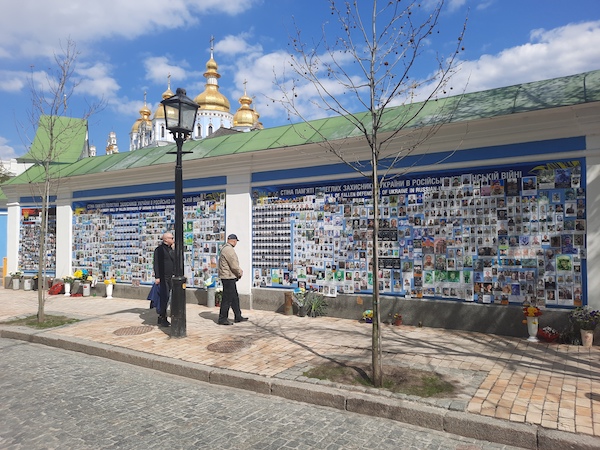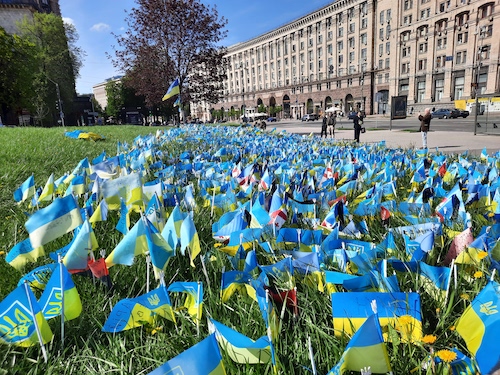
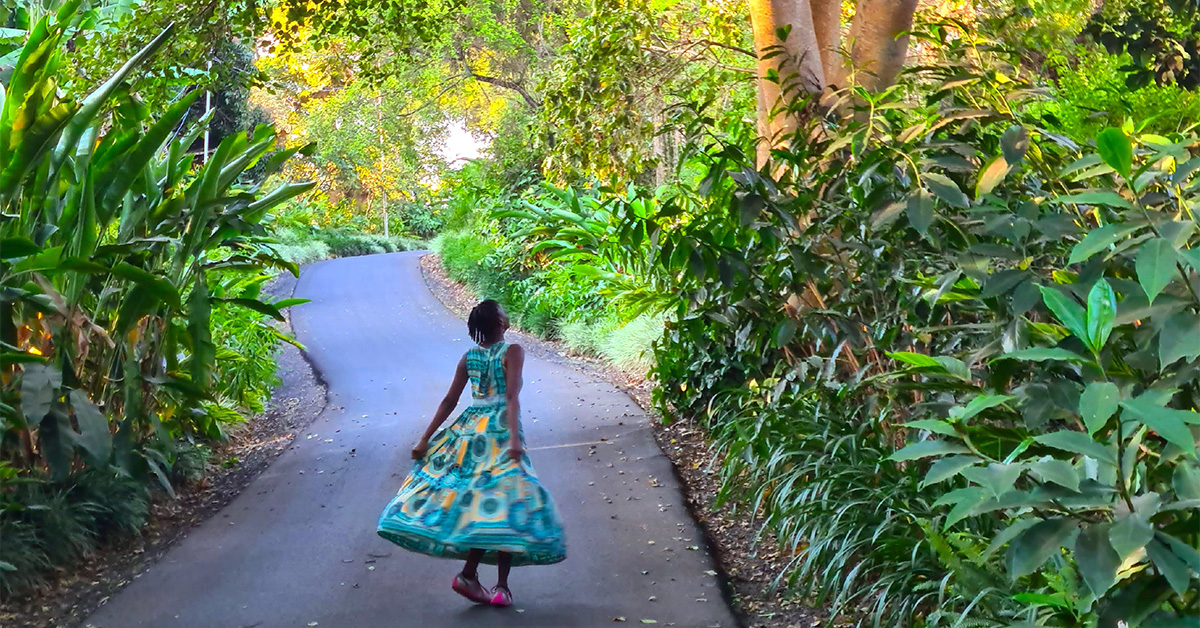
Michael Shipster, CMG, OBE, is a former British diplomat whose overseas postings included the Soviet Union, India, South Africa and the US. Translation of “Testament” and photographs by the author.
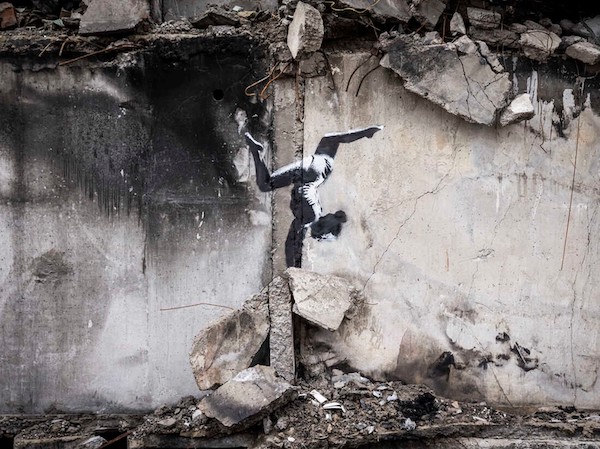
It is only on the second day of our visit to Ukraine that the impact of the war starts to come home to us. Before this, apart from patriotic posters on billboards, and street statues protected by sandbags and steel mesh, Lviv – our first stop on the way to Kyiv – could be any other elegant eastern European city on a sunny spring day. As we stroll through the cobbled Old Town, we come across a funeral cortège approaching a Catholic church. A bell is tolling, there is a choir, pallbearers are carrying three coffins draped in the blue and yellow national flag, covered with flowers. A procession of mourners is following, some in army uniform, others in black. A crowd has gathered, some onlookers are in tears. One woman, mopping her eyes, tells us it is the third funeral today at this church. “These young men, it’s so terrible,” she says. Later, as we board our train to Kyiv, we see a young couple embracing on the platform – he in uniform with a heavy kitbag, she clinging to his neck. They say little to one another and break apart only moments before the train leaves. She runs along the platform mouthing words towards the carriage window before the train outpaces her and she stops and waves a handkerchief.
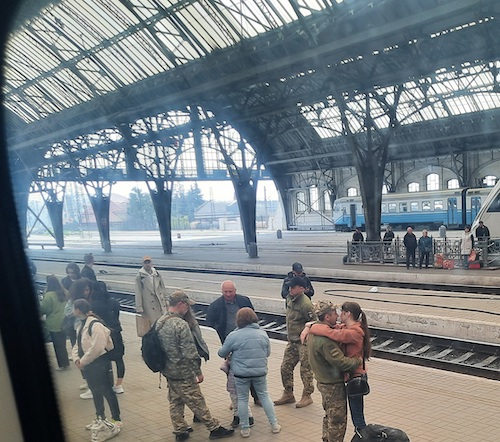
I am travelling with two journalists, one a friend from thirty years ago when we were both covering the transition to democracy in South Africa, he for his London newspaper, I for the British Foreign Office. This is our first visit to Ukraine since the Russian invasion on 24 February last year. We are going to see for ourselves the impact of the war and get an idea of what Ukrainians are fighting for and what outcome they expect.
In Kyiv, as in Lviv, appearances are initially deceptive. On the surface, this seems a normal city going about its daily business: people strolling, traffic flowing, restaurants and street cafés open and full. But, as we soon realise, the war is everywhere, the main subject of conversation, affecting every part of peoples’ lives, their hopes, expectations and prospects. Even if the physical signs – ruined buildings, burned-out tanks, cemeteries – are mostly out of sight, the war hangs over the country like a cloud.
If Putin’s main aim in launching this attack was to re-assert Russian control over Ukraine, to subjugate and cow its people, it is already clear he has failed. From young men on the streets, professionals in their workplaces, government officials and pensioners shopping in the markets, the mood is one of stubborn defiance, of anger and outrage, often shading into implacable and voluble hatred. Not just for Putin and his close circle – military chiefs, security operatives, oligarchs and idealogues – but for all Russians.
As we now know, the intelligence on which Putin relied before launching this invasion – that Ukrainians would welcome Russian forces as liberators, freeing them from Ukrainian fascists and Western hegemony – was utterly mistaken. Ukrainians have fought harder and better than expected, President Zelensky has proved to be a doughty and inspirational war leader, a brilliant communicator, both with fellow Ukrainians and the outside world. Foreign support for Ukraine has been more generous and sustained than Putin expected, enabling Ukrainian forces to inflict heavy losses of men and materiel on the Russian invaders, necessitating among other responses tough new conscription laws to replenish the ranks. The effects of these setbacks on Russian morale and commitment to the war, and support for Putin, are hard to assess – such is the closed nature of Russia these days – but may prove to be his undoing. Historically, Russian leaders who fail in war seldom survive. But one of the consequences is beyond doubt: it has united Ukrainians of all political, religious, regional and ethnic backgrounds, to forge the very nation that Putin and his Russian nationalists deny ever existed or could have any legitimacy.

Unsurprisingly, as we travel north of Kyiv, this public mood of defiance and enmity towards Russia is strongest in the villages that were occupied by Russian forces for a few weeks during the initial attempt to seize Kyiv. Here we also encounter another sentiment: contempt. Not only were Russian soldiers brutal and cruel, people tell us, they were stupid and incompetent. They got lost, they ran out of fuel, their tanks got stuck in marshy ground, they didn’t seem to be following an organised strategy. In the radioactive zone around the former nuclear power station in Chernobyl, Russian troops dug trenches, slicing through the protective topsoil to toxic layers below, in which they made their bivouacs and slept.
The soldiers were amazed that local people were unfriendly. “We’ve come to liberate you,” the advance units shouted. “We don’t need to be liberated, thank you. Go back to Russia and tell Putin to **** himself,” came the reply, using Ukraine’s most famous defiant expletive, now to be seen everywhere on posters and even on postage stamps. In Bucha, when Russian troops belatedly became aware that local civilians were using mobile phones to report on troop movements and locations, bringing down airstrikes on concentrated army columns, they went on a rampage of slaughter and revenge.
Some local residents express withering pity for the young occupying soldiers, far from home. “They didn’t know why they were here. They were amazed at the way we live. Our houses seemed luxurious to them – air conditioners and even inside toilets! They ran out of supplies, they became hungry, they turned savage.” By the time the Russians pulled out, leaving behind their dead comrades and ruined vehicles, any vestige of sympathy from local people had vanished. We ask whether there was any collaboration. “Perhaps. Some people don’t know which side they’re on. But not many, and they disappeared.” What happened to them? A shrug by way of response. “Dogs die like dogs.”

Fr Andriy, the Orthodox priest in Bucha, meets us in the crypt of his church. In the first two months of the war, he saw the aftermath of some of the worst atrocities. He presided over the burials of local inhabitants, many of them his parishioners, including over a hundred of them in a mass grave behind his church. As he relates these horrors, he cuts a dignified, austere, thoughtful figure. If he feels anger or hatred towards Russians, he keeps it under control. We ask him about the stance of the Russian Orthodox Church. How could it condone and encourage such acts of barbarism? How could the head of the church in Moscow, Metropolitan Kirill, declare this to be a Holy War, assuring Russian soldiers that if they die in battle their sins will be forgiven and they will go to heaven?
Fr Andriy says we should understand the character of the Russian Orthodox Church. It has long been a department of state, a tool of the Russian government. Under the Tsars it served the autocracy. Although initially suppressed after the 1917 Bolshevik revolution, Stalin revived it during the Great Patriotic War to help defeat Hitler. After victory in 1945, Stalin allowed the church to continue to exist, but within tight controls. Its leaders were in the pay of the state and it was infiltrated by the KGB. While the older generation of Russians was permitted to practise, religious observance for the young was discouraged and the organised spread of religious belief was illegal. Now, Putin, the former KGB operative, once again raises up the church, but only as an organ of state, in support of his rule and this criminal war.
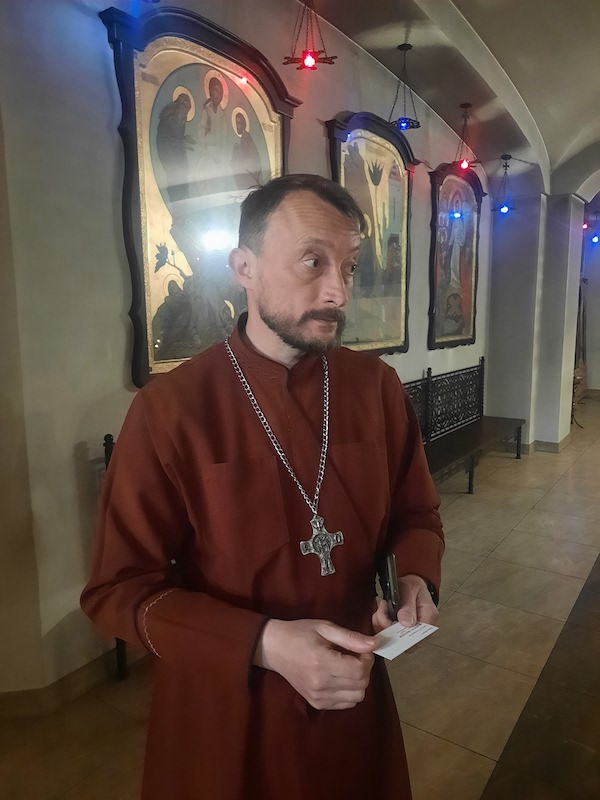
The day before our visit to Bucha we witness a street demonstration at the Kyiv-Pechersk Lavra, one of the largest religious compounds in Kyiv, used by the Russian Orthodox Church. A group shouting “Russian priests go home to Russia!” is protesting against the use of the monastery for pro-Russia propaganda and subversion. Standing between them and members of the Russian Orthodox community gathered at the gates is a detachment of Ukrainian police.
We ask Father Andriy what he makes of this. He replies he is proud of the role of the Ukrainian police in protecting public freedoms. “This is in the European democratic tradition; and we want to be part of Europe. This could not possibly happen in Moscow. Our differences are not about faith – there are many sincere believers in Russia – but politics; about how the church is led and exploited.” Is there scope for reconciliation? “Only if Russia, and the Church as its accomplice, are able to admit their crimes and atone for them,” he says. “Putin openly admires Stalin, whose crimes exceeded those of the Nazis. No wonder that Russian forces continue to commit such atrocities now.”

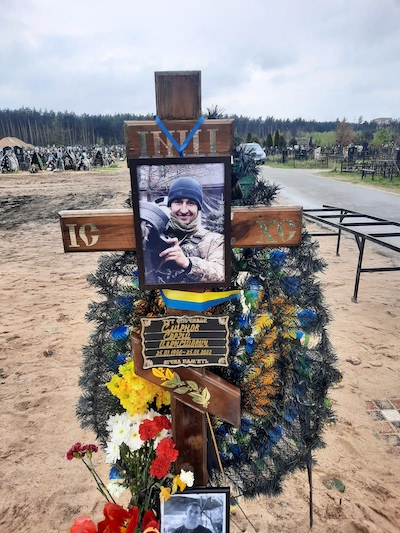
In the west of Kyiv there is a commemorative park which reaches back to horrors committed eighty years ago in an earlier war: Babi Yar, scene of the worst single atrocity in the Second World War. When invading German troops captured Kyiv in September 1941, they rounded up the local Jewish population, took them to the edge of a deep ravine, ordered them to undress and shot each one with pistols and machine guns. Some 33,000 were murdered in 24 hours, the bodies piled in layers until the ravine was almost full. In the following two years, until the Red Army liberated Kyiv in late 1943, a further 70,000 people were murdered and dumped in Babi Yar: more Jews, captured Soviet prisoners of war, Roma people, the mentally ill, local troublemakers.
In 1961, the Russian poet Yevgeny Yevtushenko published his poem “Babi Yar” to protest against anti-Semitism and the Soviet Government’s failure to commemorate the massacre. Eventually, in 1976 a monument was erected on the site. But, consistent with Soviet reluctance to give any special emphasis or status to victims of the Jewish Holocaust, the inscription reads merely that “Here in 1941–43 over 100,000 residents of Kiev and prisoners of war were executed by German-fascist invaders.”
Since the dissolution of the Soviet Union in 1991, new monuments to the victims have been erected, but controversy continues over how to commemorate Babi Yar. Some of the memorials have been defaced and vandalised, motivated by either anti-Semitism or anti-Soviet feeling. When I visit, I notice the plaque on the Soviet monument is stained by some liquid. It might be urine.
A different kind of defacement occurred soon after the start of the Russian invasion a year ago. Three Russian missiles, aimed at the adjacent 385-metre telecommunications tower – the tallest structure in Kyiv – damaged the memorial park. The tower, however, although now leaning slightly, is still standing: a monument to the reckless brutality of these new invaders from the East and their trashing of the common history of their countries.
During our visit, many refer to the war as attempted genocide. Putin, they say, wants to eradicate the Ukrainian nation: its culture, language and identity. Russian missiles indiscriminately target residential areas, hospitals and schools. Their soldiers rape and murder, without mercy or remorse. “They want to destroy us all,” they say. “How is this different from Nazi genocide?” My journalist friends, who on their way to Ukraine visited the Nazi concentration and death camps at Auschwitz-Birkenau, insist they have seen what real genocide looks like, and this war does not qualify. They agree, of course, this is a brutal, criminal war, but question whether the Russians plan to murder all Ukrainians. There is as yet no new Babi Yar. But this is a discussion that can have no conclusion. Our areas of agreement are far more important than this semantic disagreement.
Our final stop is Odesa, Ukraine’s principal Black Sea port. We travel through the night in a comfortable sleeper train and arrive refreshed at dawn. Apart from the absence of tourists, and the closure of the famous Potemkin Steps leading down to the harbour, it seems uncannily peaceful, a good place to bring a family on holiday.
It is here that we try to bring the experiences and insights we have gained to some kind of conclusion. This is not like other wars between deadly enemies, where it is possible to imagine clear victory or defeat. Through this reckless military adventure, Putin has inadvertently but irrevocably driven Ukraine into the European embrace. He has lost, probably forever, the chance to bring Ukraine back into the Russian fold. But, on its own and even with substantial Western assistance, Ukraine is unlikely to be able to achieve complete military victory.
Russian military tactics in the eastern and northern areas have been brutally destructive, scarred by individual atrocities and systematic war crimes. Other parts of the country, however, have been relatively unaffected. This is far from total war; but it could still be the precursor to one. What Ukrainians are fighting for is obvious. What Russian soldiers are fighting for is not. Russia cannot possibly subjugate Ukraine, but nor is it likely to lose. Equally, while Ukraine will surely survive as a country it is unlikely to realise all its war aims: withdrawal of all Russian forces back to the 1991 borders (returning Crimea therefore to Ukraine), Russian reparations for war damage, punishment of those, including Putin, responsible for war crimes, and reliable guarantees of Ukraine’s future territorial integrity and security.
A nuclear power cannot be completely defeated without risking recourse to nuclear weapons. That after all is the whole point of having them: Mutually Assured Destruction, the Mexican Standoff. At the same time, Putin cannot back down. Otherwise, he risks being ousted. Staying in power is the war aim he will abandon last. He is likely therefore to plough on, in the belief that the Russian people can bear prolonged pain, loss and international isolation, outlasting the Ukrainians; also, that Western support for Ukraine will weaken, perhaps accelerated by victory for Donald Trump in the presidential election next year. In such circumstances Putin might hope to force Ukraine to the negotiating table, enabling Russia to hang on to its territorial gains, including Crimea. He might secure an undertaking that Ukraine will never join NATO and its territory will be a demilitarised zone. Russia will refuse to pay war damages and cannot be compelled to do so; there will be no prosecutions by the International Criminal Court. Russia could probably live with international sanctions in some form. In other words, a result that could be represented as victory.
Such an outcome is by no means certain or even likely. Most of the conceivable scenarios for the war are dangerous and potentially catastrophic for all parties: Ukraine, Russia, the West, the “international rules-based order,” the rest of the world. One could be a “forever war” between Russia and Ukraine, always teetering on the brink of dangerous escalation. Or Russia sinking deeper into pariah status, becoming in effect a rogue state, intent on destabilising the comfortable peace to which the West aspires; meanwhile acquiring by whatever means possible allies in the global south, where existing suspicions of US and Western hegemony offer a good environment for Russian influence to spread. Or worst of all, perhaps, a situation where the Russian Federation – the present rump of the former Tsarist and Soviet empires – begins to disintegrate. What would happen then to the six thousand or so nuclear weapons Russia now possesses? What temptations would there be for Russia’s neighbours, especially China, to capitalise on Moscow’s loss of control, especially in the resource-rich, sparsely populated Far East?
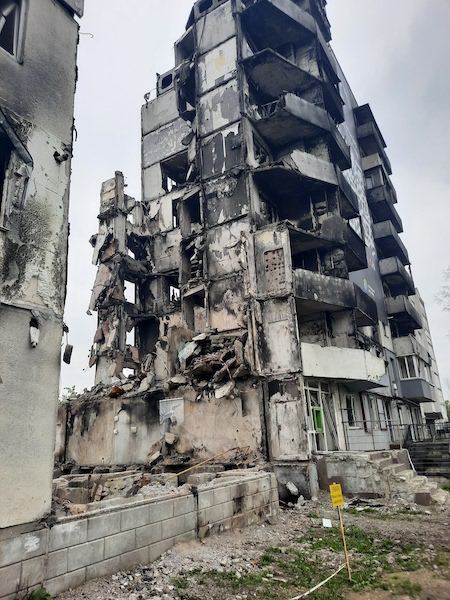
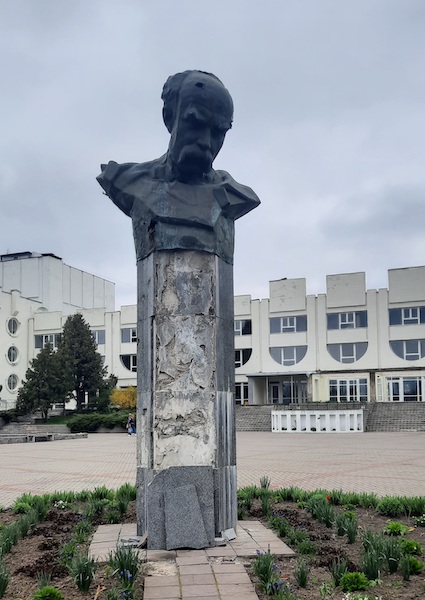
A week after my return to London I attend the premiere of a documentary film about the war, Freedom on Fire, directed by the Ukrainian Oscar-nominated filmmaker Evgeny Afineevsky. It is bleak and harrowing, recording through the eye-witness accounts of mostly women and children some of the worst atrocities and suffering of this last year. During the discussion afterwards, one participant, going against the flow of other comments, questions the role and motives of the West in supporting Ukraine. He cites the genocide of Uighurs in China, and of Rohingya Muslims in his own country, Myanmar. These killings, he says, have been going on for longer and are on a larger scale than those in Ukraine. Yet this war between two European nations has all but obliterated news coverage of those others. Furthermore, the plight of Ukraine attracts a disproportionate slice of Western humanitarian support, including for refugees. Could this be, he asks, because donor nations like Britain identify more closely with white-skinned humanitarian causes than those involving brown skins? Are our choices and policies driven by racism?
After the questioner sits down, I put up my hand. I agree these are important questions, but this is not the time and place to debate them. We have just seen a truthful, highly personal film by a Ukrainian director bearing witness to what has been committed in his own country, to ensure these crimes are not forgotten and Ukraine continues to get the support it needs. The reason the plight of the Ukraine war resonates so strongly with people in Britain is because Russia poses a clear threat also to Europe, and possibly the wider world. If only this film could be shown in Russia where Russian minds are closed by official lies and distortions to the reality of what is happening.
To conclude: is it possible that a fair and lasting peace might be achieved for Ukraine, free to choose its own destiny in Europe, without threatening Russia’s own core interests? I fervently hope so. I have the clearest memory from our visit of the hopes expressed by brave, talented, humane, open-minded Ukrainians we met. They deserve a good future, certainly some better luck than history has so far allotted their blood-soaked land over the centuries. Conversely, if Russia prevails in Ukraine, the defences of all countries against brutal subjugation by a more powerful adversary will be profoundly weakened.
To end with, “Testament” by Taras Shevchenko, Ukraine’s nineteenth century national poet:
When I die, O bury me
In a tomb raised high
Above the rolling steppe
In my beloved Ukraine
Where I can see the wide
And mighty Dnieper
Its rugged shores
And hear its roaring waters
When from Ukraine the Dnieper brings
The blood of enemies down towards
The sea, then can I leave
These hills and fruitful fields –
I will depart and fly beyond
Unto the home of God,
And then I’ll pray …. But till that time
My God I do not know.
So bury me, then stir yourselves
And split your heavy chains.
Bless with blood of enemies
The freedom you have gained.
And in the great new family,
A family that’s free,
With a soft and kindly voice
Also remember me.
